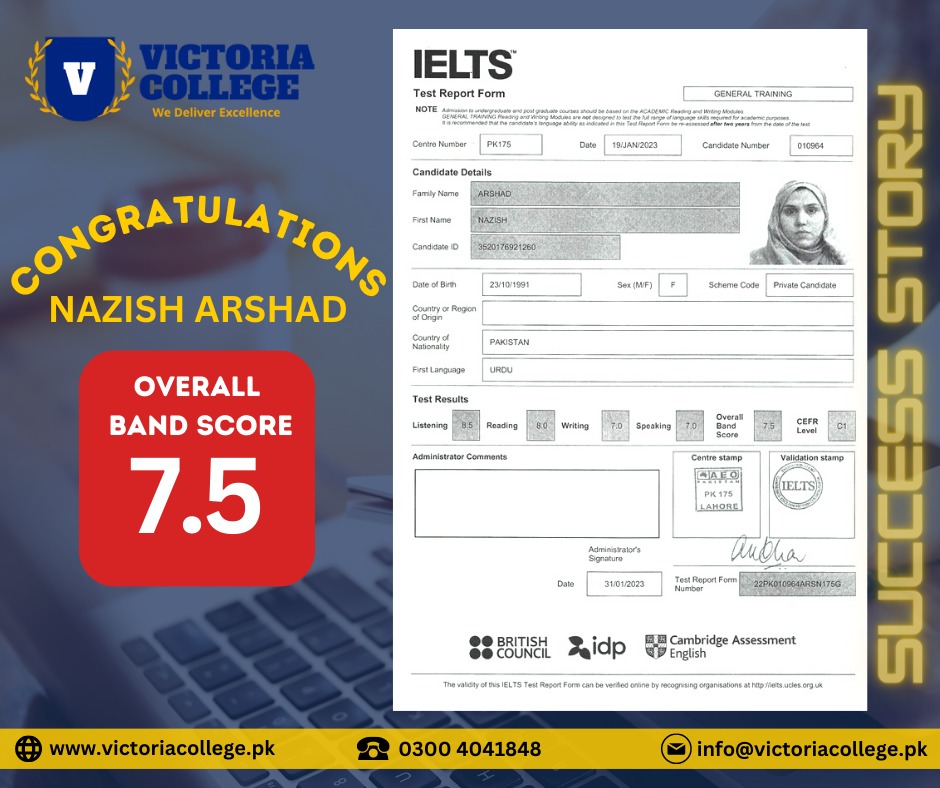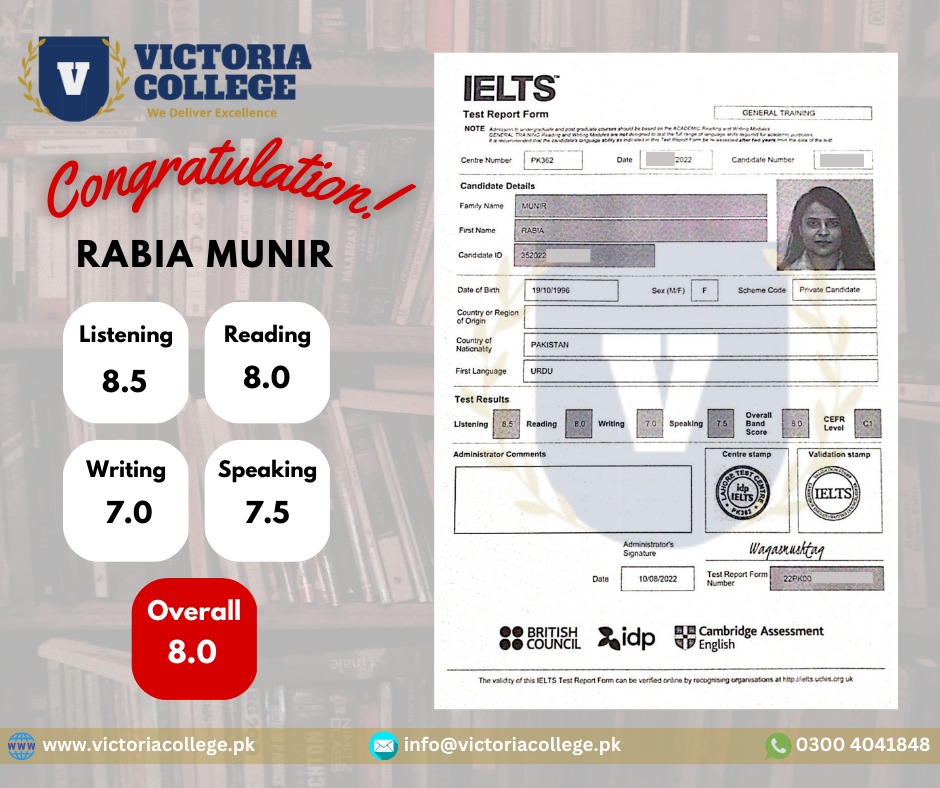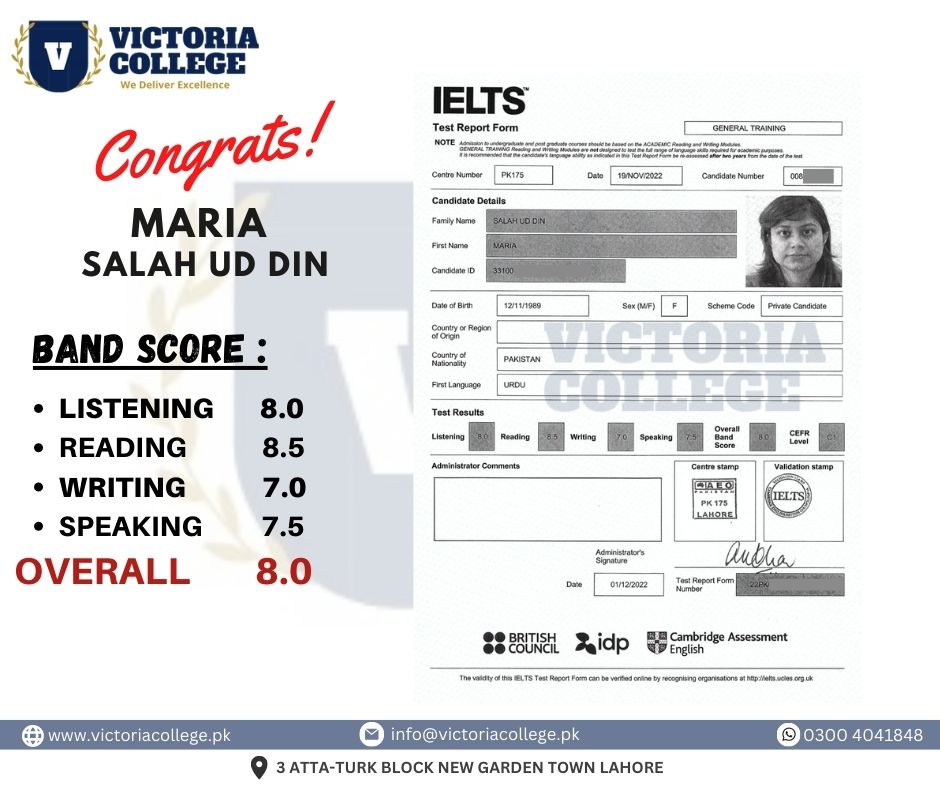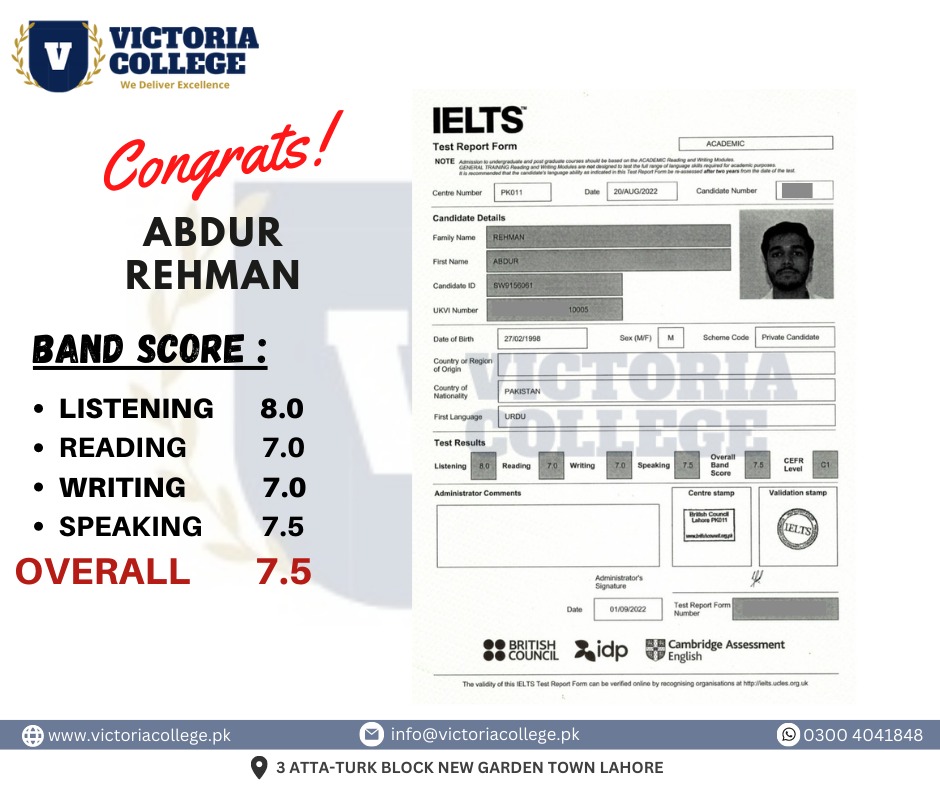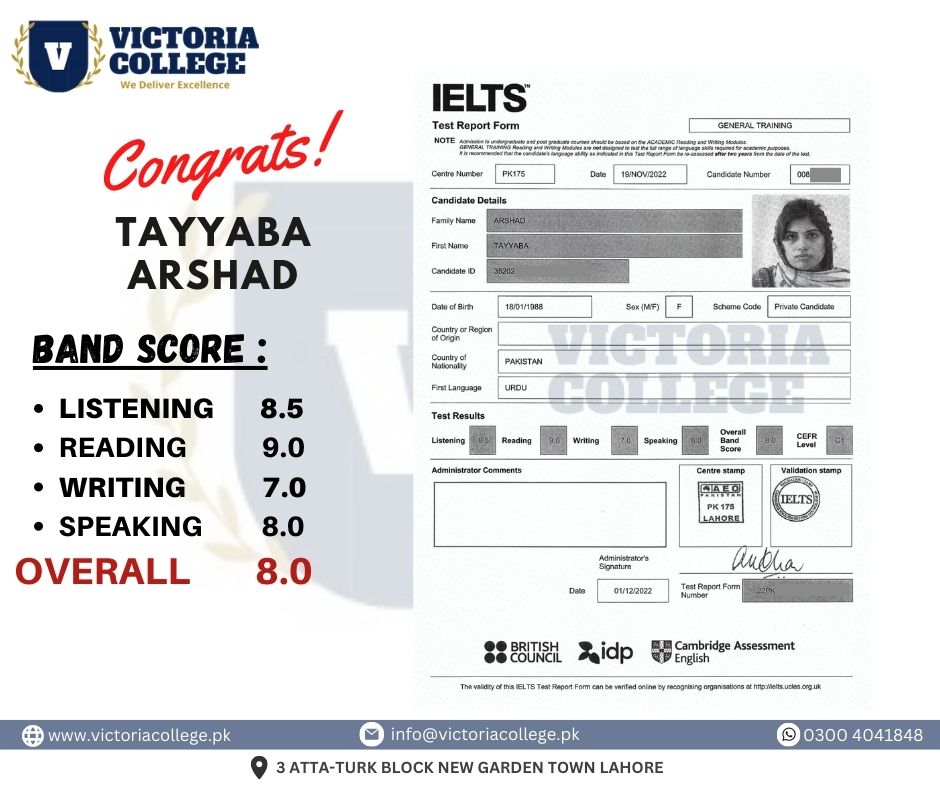Victoria College providing the Best IELTS Preparation in Lahore. We have devised a plan where all four modules are covered every single day. This approach will increase the confidence of the students. The International English Language testing system is a well-renowned exam accepted by over 150 countries.
We at Victoria understand that this high-stake exam might be the only thing refraining you from living your dream and we would do everything possible to ensure that you achieve your desired bands.
Three sessions are held daily Mon-Fri at Victoria College Lahore covering all four modules daily this practice almost guarantees you success.
What Students Are Saying

I found the staff at Victoria to be highly Competent and their guidance enabled me to secure my desired bands for a U.K study Permit.

I recommend Victoria IELTS College for preparation. After visiting so many options I choose Victoria because it is the best place where skills are polished and confidence level is boosted. I found Sir Naveed Niazi and all the staff very supportive. Sir Naveed Niazi is the best mentor, I have ever met in my life. It’s the best platform for future builders.
IELTS Preparation in Lahore With Victoria IELTS College
IELTS Preparation
When it comes to preparing for IELTS, everyone searches for a place where he or she can find one window solution in terms of preparing all the modules of IELTS at the same time, and at the same pace for all the modules. While searching for the best place to prepare for IELTS in Pakistan, most students come across the name of Victoria IELTS College and then they can not go for any other option because of the quality we offer. Victoria IELTS College is the premium IELTS preparation institute in Lahore and Gujranwala, and our students are from all over the country including remote areas. Students always consider Victoria IELTS College as the only choice because of the effort we put into them. Finding quality at a competitive fee is a hassle, but Victoria IELTS College has solved this hassle. We offer one window solution for all the modules of IELTS including Listening, Reading, Writing, and Speaking for a very nominal fee. No academy in Pakistan provides such an opportunity to the students aiming to settle abroad.
We have campuses in Lahore and Gujranwala. Lahore is the second largest metropolitan city in Pakistan and Gujranwala is the fifth largest city in Pakistan. We aim to cover the whole of Pakistan through our online session, and students from across the country join us in our physical as well as online preparation sessions.
Our methodology of teaching IELTS is unlike other institutes offering IELTS coaching to aspirants. We cover all four modules daily. To assess the preparation level of students, we conduct weekly IELTS mock tests in which we make students follow the same pattern as happens in the original IELTS exam. Therefore, our students find very little difference on exam day in terms of exam pressure. As we conduct classes on regular basis for Listening, Reading, Writing, and Speaking, the results speak for the effort we put in while teaching IELTS to the students.
Our fees are the most affordable in Pakistan when compared to the quality of education we provide. If someone wishes to find the best IELTS preparation academy in Lahore, Victoria IELTS College is the place to choose.
Our IELTS preparation course is the best course in Pakistan. The action plan we provide to pupils ensures their success in the IELTS test. Many institutes in Lahore and Pakistan offer demo classes for which students have to attend physical sessions to judge how the preparation goes. We at Victoria IELTS College do not do like this. We have uploaded as-live demo classes for Listening, Reading, Writing, and Speaking individually, so that students and IELTS aspirants who have to embark on the journey of success in IELTS may not need to invest their resources before taking a decision. Students can better decide if our methodology suits them or not by watching our as-live lectures on our Facebook page, even before starting the classes formally. We are sure that students will always choose Victoria IELTS College after watching the demos, as we teach what is actually required for acing the exam. Students in Lahore and the suburbs find us as the top option when they have to look for the IELTS preparation institutes near them. The duration of our preparation course is 6 weeks. We especially focus on academically challenged students, and we make sure that students may not need to appear again in exams except for the first time after preparing for IELTS from our institute.
We offer comprehensive services to our students, from studying and preparations to booking for the exam. We are platinum-plus partners with British Council and IDP, so we are considered in high ranks in terms of serving the students at best. We offer test booking services for our students. Students just have to pay the fee, and the rest is on us. That is the reason, all of our students prefer booking their test dates from our platform. Students can choose to pay for the IELTS preparation fee and IELTS test registration fee from all over the country from any payment platform as we facilitate students in all possible ways.
At the end of the course, we also facilitate students in preparing for their next journey abroad as well.
So, what are you waiting for? Come and experience world-class IELTS preparation services at Victoria IELTS College.
IELTS Reading Tips And Tricks
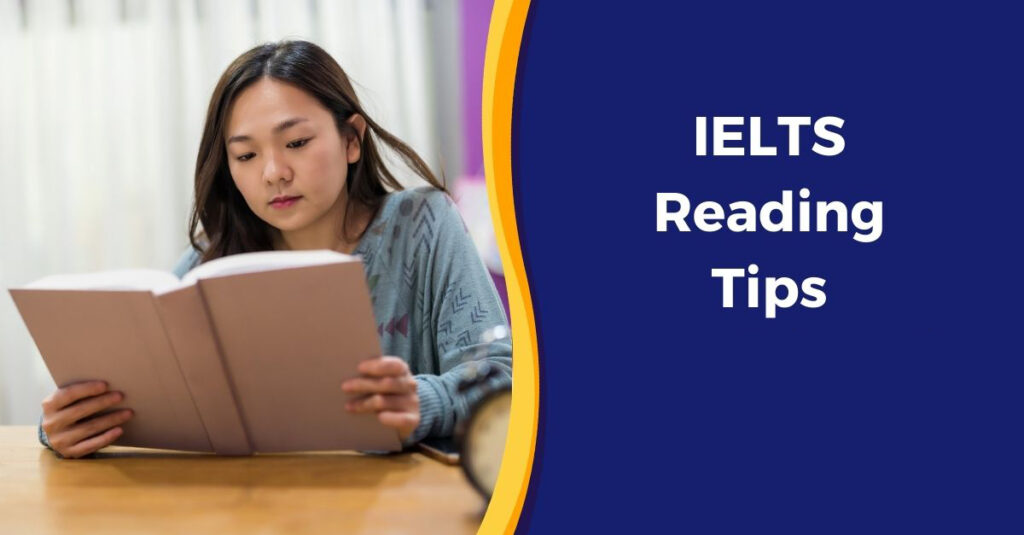
READING is a vital part of the IELTS test. If you know IELTS reading tips, it would be helpful in the pavement of IELTS reading tests. The reading portion of the exam gauges the test-capacity takers for understanding and critically analyzing a variety of literature, from scholarly to everyday life. Both IELTS academic and general reading tests are similar in the context of passage availability. However, the passages are of academic content in Ielts academics and in general IELTS, it is of daily happenings and encounters that may occur in a native English-speaking country.
The time constraint, tough vocabulary, and difficulty level of the readings in the IELTS reading section cause many test-takers to have problems. The exam environment’s stress can also increase the difficulties. Yet, test-takers can improve their reading skills and increase their chances of getting a decent grade by properly preparing and using efficient tactics.
This article seeks to offer practical advice and methods that people can utilize to get past the typical difficulties they can experience when taking the IELTS reading test. It addresses issues including time management, comprehension of the many sorts of questions, skimming and scanning strategies, and vocabulary development. Test takers can improve their reading abilities and raise their chances of getting the score they want by paying attention to these pointers.
Table Of Content
What Kind Of Passages Are Given In The IELTS Reading Test ?
Level Of Difficulty And Types Of Questions In IELTS Reading Test
Application Of Strategies With Examples
Time Management Tips For IELTS Reading
What Kind Of Passages Are Given In The IELTS Reading Test?
The goal of the IELTS reading test is to evaluate a candidate’s proficiency in reading and comprehending English-language texts. The test consists of three passages, each of which has a set of questions meant to evaluate a variety of reading abilities, including gist reading, detail reading, and determining the author’s purpose.
The IELTS reading test includes passages from the following three categories:
- Academic passages – These passages are from scholarly works like books, journals, and research papers. They are made to evaluate a candidate’s comprehension and analysis of challenging academic literature.
- General Training passages – These passages were collected from commonplace publications including pamphlets, newspapers, and commercials. They are made to gauge a candidate’s capacity for deciphering and interpreting data from various sources.
- Mixed passages – These passages include academic and general training literature. They are made to assess a candidate’s capacity to move between reading styles and learn new material.
Structure Of The Passage
The passages in the IELTS reading test might vary in structure, although they typically have 700 to 900 words. To make it easier for the candidate to browse the text, the paragraphs have been organized into sections with headings and subheadings. The readings might contain charts, tables, or diagrams that the applicant will need to interpret in order to respond to the questions.
Level Of Difficulty And Types Of Questions In IELTS Reading Test
The passages in the IELTS reading test range in difficulty from easy to demanding. But often, they are written at a level that is suitable for undergraduate or graduate students. The questions may require the candidate to comprehend passages with sophisticated language and sentence patterns.
The IELTS reading test includes the following sorts of questions:
- Multiple choice -A question and a list of options are presented to the contestant. They must decide on the response that best fits the question’s requirements.
- True/false not given – The applicant is given a statement, and using the details from the passage, they must determine if the statement is true, false, or not given.
- Matching – The candidate is shown a range of possibilities, and they must match them to a set of statements or descriptions.
- Sentence completion – The candidate is given an incomplete sentence, and they must complete it using the passage’s material to fill in the missing word or words.
- Short answer – A question is posed to the candidate, who must respond in a few words or a single phrase.

IELTS Reading Tips
- Read instructions carefully-Candidates should carefully read the instructions and take note of any unique requirements or constraints before approaching these types of questions.
- Read the passage quickly- they should read the passage quickly to get a general understanding of the topic and structure.
- A quick reading of questions-Then, in order to determine the answer, they should attentively study the question and the essential section of the passage.
- Pay attention to keywords-It’s necessary to pay attention to keywords and phrases as well as any contextual hints that could provide the solution.
- Check your answer- Before moving on to the next question, candidates should review their responses to ensure that they are accurate and understandable.
- Skim and scan-Skimming and scanning are crucial strategies that can assist candidates in finding the passage’s pertinent content and the answers to the questions. Scanning entails looking for specific information or important phrases in the text, while skimming involves reading fast to acquire a basic understanding of the passage’s substance and structure.
- Read headings and subheadings-Candidates should begin by reading the headings and subheadings of the paragraph to acquire a sense of the topic and structure in order to employ these approaches successfully.
- Attentive while skimming passage-They should then swiftly scan the material, taking note of any bolded or italicized text as well as any diagrams or charts.
- Look for specific info- Afterwards, they should scan the text for any instances of such terms, paying close attention to the context in which they are used. Candidates can increase their chances of providing the right response by doing this and finding the necessary information promptly.
- Identifying keywords and phrases-A vital reading technique that might assist candidates in finding the right information quickly and effectively is the identification of keywords and phrases. Candidates should carefully read the question and seek any particular terms or concepts stated in order to find keywords and phrases.
Keywords are words that are directly related to the topic or concept being discussed, while key phrases are groups of words that convey a specific meaning or idea.
IELTS Reading Strategies
The SQ3R approach is a thorough reading technique that can assist candidates to increase their reading retention and comprehension. Five steps make up the methodology: survey, question, read, recall, and review.
- Survey -This phase is reading the headings, subheadings, and any bold or italicized text to get a preview of the piece. Also, candidates should search for any charts or diagrams that might contain supplementary data.
- Question – Create questions based on the headings and subheadings in this step. Also, candidates should develop their own questions based on any major terms or ideas that are associated with the topic.
- Read -Reading the passage thoroughly and paying attention to any pertinent details or important words and phrases is required for this phase. Also, candidates should make notes on the important points and evidence.
- Recall – This stage incorporates mentally retrieving the major points and supplementary information. Applicants ought to make an effort to respond to the queries they had previously developed.
- Review – Reviewing the passage and double-checking the questions’ responses are part of this phase. Applicants should reread their notes and make an effort to rephrase the key points.
Tips For Applying Strategies
- Candidates should carefully study the instructions and determine the type of question being given before using these tactics for various question types. Finally, they should employ the proper technique to track down the necessary data and provide a precise response to the query.
- Candidates should carefully examine the question and the options before answering a multiple-choice question, for instance. The next step is to look over the passage for any relevant terms or phrases that relate to the question. In addition, they should rule out any possibilities that are blatantly erroneous and select the appropriate response in light of the passage’s facts.
- Candidates should carefully examine the sentence in true/false/not given questions before identifying any important words or phrases. Then, they should skim the passage to decide whether the assertion is true, false, or not given based on the information in the passage.
- Candidates should carefully analyze the alternatives for matching questions and note any keywords or phrases. Afterward, they should skim the section for the phrases or descriptions that correspond to each choice.
- Candidates should carefully study the unfinished sentence in order to identify the essential words or phrases before answering questions about sentence completion. Finally, they should skim the text to identify the word or words that are necessary to finish the phrase.
- Candidates should carefully study the question and note any significant words or phrases before responding to a short answer question. Finally, they should read the section to discover the details that provide a clear and short response to the question.
Application Of Strategies With Examples
Here are some examples of how to use the reading strategies we previously mentioned for various question types:
- Multiple-choice questions:
- Read the question and options carefully
- To gain a sense of the topic and structure, just skim the passage.
- Look for crucial terms or phrases that are connected to the question in the passage.
- Remove all alternatives that are blatantly wrong.
- Based on the information in the passage, select the best response.
For instance, What is the passage’s primary goal? A. to provide background information on the subject B. to compare various treatment options C. to describe the symptoms of the illness D. to make an argument for the value of prevention
- True/false/not given questions:
- Find the important words or phrases by carefully reading the assertion.
- Determine whether the assertion is true, untrue, or not given based on the information in the passage by skimming it.
Example question: The author suggests exercising as a means of preventing heart disease. False, True, or Not Given
- Matching questions:
- Determine the important words or phrases by carefully reading the choices.
- To gain a sense of the topic and structure, just study the passage.
- Search the paragraph for the statements or descriptions that correspond to each choice.
Example question: Please match the following researchers with their findings: Marie Curie, a. Isaac Newton, B. Charles Darwin, C
- Developed the law of evolution
- Radiation was discovered
- Revealed the law of motion
- Sentence completion questions:
- Choose the crucial words or phrases by carefully reading the incomplete statement.
- Search the text for the word or words that are necessary to finish the phrase.
Example question: ______ is happening more frequently as a result of the rise in global temperatures. (1) Droughts (2) Flooding (3) Earthquakes
- Short answer questions:
- Determine the relevant words or phrases by carefully reading the question.
- Look for the details in the passage that will help you provide a clear and concise response to the question.
Example question: Who was the first person to set foot on the moon?
IELTS Reading Time Management
For the IELTS reading test, time management is a crucial ability to acquire. The purpose of the test is to evaluate a candidate’s capacity for reading and comprehending a variety of English-language materials as well as for accurately and quickly responding to questions. Candidates have a total of 60 minutes to finish the test, which is broken into three passages with a specific amount of questions each. Candidates who possess effective time management techniques will finish the exam on schedule and prevent running out of time.
Time Management Tips For IELTS Reading
Candidates must allot enough time for each passage and question in the IELTS reading test in order to successfully manage their time. Here are some pointers on how much time to give each passage:
- Equally, divide the total time: Candidates can set aside 20 minutes for each of the three passages.
- Scanning of passage: Applicants can quickly scan the paragraph to acquire a sense of its structure and subject matter. When students read the paragraph, this will make it easier for them to comprehend the key concepts and find relevant information.
- Carefully read the passage: Applicants should strive to read and comprehend the passage in 5–6 minutes. This will make it easier for them to recognize the passage’s major points, tone, and intent.
- Assign time for each question: Applicants should plan on taking between one and two minutes to respond to each. However, they should modify the time allotment according to how challenging the question is.
- Keep yourself focused: To finish the IELTS reading test on time and correctly answer questions, it’s essential that you keep concentration. Here are some tips for maintaining concentration and limiting distractions:
- Remove any outside distractions: Applicants should make sure they are seated in a quiet area with few outside distractions. They should put away their cell phones and other electronics, and ask others not to bother them.
- Handle internal distractions: Applicants need to develop the ability to control internal distractions like tension or worry. To calm themselves, they can exhale deeply, move their muscles, or close their eyes for a little period of time.
- Examine the questions thoroughly: Applicants should carefully read the directions and questions to make sure they know what is required of them. Making mistakes or wasting time can result from not understanding the directions or queries.
- Skim the passage first: Then, candidates should quickly peruse the material to acquire a sense of its theme and organization. When students read the paragraph, this will make it easier for them to comprehend the key concepts and find relevant information.
- Pick out the keywords and phrases: Applicants should highlight relevant phrases and words in the passage and the questions so they can more quickly find the information they need. To make it simpler to find these terms later, they can highlight or underline them.
- Pace oneself: Applicants should pace themself and make sure they are responding to questions at a constant speed. They shouldn’t spend an excessive amount of time on one question or passage as this could result in them being short of time.
- Answer all queries completely: Even if they are doubtful about the answer, candidates should be sure to answer every question. As there is no penalty for giving a false answer, it is preferable to guess than to omit a response.
Conclusion
Finally, effective time management is crucial for passing the IELTS reading test. To stay focused and stay away from distractions during the test, candidates should allot time for each passage and question and pay attention to the advice given. Candidates can successfully complete the test on time and provide accurate answers by developing their time management skills and remaining focused.
In conclusion, IELTS reading tips in this article covered a variety of approaches and recommendations for acing the IELTS reading test. The various question types on the test were described, along with strategies for answering them. There was also a discussion on the value of skimming, scanning, picking out essential words and phrases, and using the SQ3R approach. There were time management hints offered, such as how to allot time for each text and question, maintain attention, and cut off distractions.
Success on the IELTS reading test requires practice and preparation. Candidates can raise their reading comprehension and their chances of getting a higher score by using these strategies and techniques.
To sum up, test takers should put the advice and techniques covered in this article to use to raise their IELTS reading scores. Candidates can face the test with confidence and receive their desired score with practice and preparation.
Top IELTS Writing Tips And Tricks
We’re glad you’re here to read our guide to the best IELTS writing tips and tricks! You could be experiencing some anxiety over the writing portion of the International English Language Testing System (IELTS) exam if you’re getting ready to take it. But don’t panic; with the correct methods and ideas, you can sharpen your writing abilities and succeed on the test.
We’ll provide you some useful advice in this article to help you conquer the IELTS writing section. These pointers will be helpful for you whether you’re taking the Academic or General Training version of the exam. Everything from comprehending the assignment’s requirements and assessing the question to organizing your essay and avoiding frequent errors will be covered.
By the time you finish reading this essay, you’ll know more about what the examiners are searching for and how to wow them with your writing abilities. In order to improve your IELTS writing score, let’s get started.

IELTS Writing Tips And Tricks
Top IELTS Writing Tips And Tricks
- Create an outline or mind map
- Choose the main points and relevant details
- Set a time limit for each paragraph
- Usage of transition words and phrases
- Utilize topic sentences and descriptive details
- Omit repetition and irrelevant information
1. Recognize The Requirements For The IELTS Writing Task
Understanding the task requirements and marking criteria is crucial before you begin writing your IELTS Writing exam if you want to perform well on the test. We will go through the first two crucial IELTS writing suggestions in this section to better assist you to comprehend the standards and guidelines for the test.
-
Understand the different IELTS writing task types
There are two tasks in the IELTS Writing exam, and it’s essential that you understand what kind you will be given.
IELTS Writing Task 1: Writing a report based on visual data, such as a graph, chart, or diagram, is required for Task 1.
IELTS Writing Task 2: You must produce an essay on the assigned topic for Task 2. You will be better able to plan and organize your writing if you are aware of the type of task you will be given.
-
Recognize the marking criteria
Task Achievement, Coherence and Cohesion, Lexical Resource, and Grammatical Range and Accuracy are the four factors that determine how well a student performs on the IELTS Writing exam.
- Task Achievement is your ability to respond to the task prompt and complete the requirements.
- Your writing’s coherence and cohesion refer to how well it is structured and related.
- The lexical resource is a term used to describe the range and precision of vocabulary.
- Grammatical Range and Accuracy refer to the variety and precision of the grammatical structures used.
The important areas that the examiner will review and grade you on will become more clear to you as you become familiar with the marking criteria. On the IELTS Writing exam, it’s critical to address each requirement in order to receive a high score.
2. Analyze The Task Prompt
One of the most important IELTS writing tips is to thoroughly examine the task prompt before you begin writing. We’ll go over three key pointers in this part to aid with your task prompt analysis.
-
Determine the kind of task prompt
Finding out what kind of prompt you are given is the first step in task prompt analysis. You can be asked to describe a graph, chart, or diagram in Task 1. You might be asked to explain an argument or express your view on a subject in Task 2. You may arrange and set up your writing suitably if you are aware of the type of prompt.
-
Analyzing the task prompt keywords
The task prompt will include precise terms that describe the assignment’s criteria and focus. Action words like “describe,” “discuss”,”analyze”, “argue”, “explain”, “debate”, “compare,” or “advantages and disadvantages” may be included in these keywords. To respond to the assignment prompt in an effective manner, it is vital that you understand the significance and requirements of these terms.
For instance, if the task prompt demands that you “discuss,” you must present both sides of the issue or topic and offer a fair viewpoint. When the prompt instructs you to “compare,” you must draw attention to the similarities and differences between the topics or concepts offered.
-
Plan your writing strategy
Planning your writing strategy should come after you have determined the prompt’s type and examined the keywords. Consider the guidelines of the task question as you outline your ideas and reasons for your writing. With an introduction, many body paragraphs, and a conclusion, structure your work rationally. Make sure you respond to the task prompt and concentrate on the main concepts and themes.
3. Plan And Organize Your Writing
When it comes to the IELTS Writing exam, effective planning and organization are essential. We will go over three key suggestions in this section to help you better plan and organize your work.
-
Create an outline or mind map
Planning your writing effectively involves constructing an outline or mind map. You may better organize your ideas and thoughts by using an outline, which also gives your writing structure. A mind map is a diagram that shows the relationships between your concepts. You can arrange and organize your writing more efficiently using either approach.
Choose the main concepts and topics you wish to include in your writing by doing this first. After that, group them using headings and subheadings into groups or sections. Include the major points and supplementary information for each section using bullet points or numbers.
-
Choose the main points and relevant details
Choose the main concepts and supplementary information for each section after creating your outline or mind map. Be sure that every point you make supports your argument or discussion and is pertinent to the assignment request. To strengthen your arguments and increase their persuasiveness, use examples and facts.
-
Set a time limit for each paragraph
When taking the IELTS Writing exam, time management is essential. According to the demands of the task prompt and the significance of each point, allot time for each paragraph. Make sure you have enough time to adequately introduce your concepts, develop your arguments, and wrap up your writing.
4. Develop A Strong Introduction
On the IELTS Writing exam, writing a powerful start is essential since it establishes the tone for your entire essay. We’ll go through two key approaches for creating a compelling beginning in this section.
-
Create a captivating hook
The first step in producing an effective introduction is to write a fascinating hook. A hook is a line or two that piques the interest of the reader and compels them to continue reading. A hook can be written in a variety of ways, including with a quote, an unexpected fact, a genuine question, or a first-person experience.
Have you ever wondered how technology has transformed our lives? is a good example of a rhetorical question you might use to open your introduction if your job is to examine the benefits and drawbacks of technology. The reader will be immediately captivated by this and eager to read more.
-
Provide a concise thesis statement
A compelling thesis statement is the second step in creating an effective introduction. A thesis statement is a brief paragraph that encapsulates the primary idea or contention of your essay. It should be concise and straightforward and serve as a guide for your work.
For instance, if your objective is to examine the benefits and downsides of technology, your thesis statement can be something like “Although technology has improved our lives in many ways, there are also certain pitfalls that we must take into account.”

5. Focus On Coherence And Cohesion
Success on the IELTS Writing test depends on coherence and cohesion. Here are three ideas to help you concentrate on coherence and cohesion in your writing.
-
Usage of transition words and phrases
Transitional words and phrases join sentences and concepts together. They aid in giving your writing a sense of coherence and cohesion. The phrases “however,” “moreover,” “in addition,” and “on the other hand” are examples of transition words and phrases.
You may make your writing flow readily and demonstrate to the reader the logical extension of your ideas by employing transitional words and phrases.
-
Utilize topic sentences and descriptive details
In order to ensure clarity and cohesiveness in your writing, topic sentences and supporting facts are crucial. The supporting details are the arguments or instances that bolster the topic sentence, which serves as the paragraph’s major theme.
Make sure each paragraph includes a distinct topic sentence that refers back to the thesis statement and establishes the paragraph’s focus. To support your claim or debate, provide evidence that is appropriate to and particular to the topic sentence.
-
Omit repetition and irrelevant information
The clarity and cohesion of your work might be hampered by repetition and extraneous content. Try to refrain from utilizing the same thoughts, words, or phrases over and over again. Make sure that every sentence and paragraph is connected to the task prompt and your essay’s main theme.
6. Apply Proper Grammar And Vocabulary
Employing the right grammar and vocabulary will help you perform well on the IELTS Writing exam. This section will cover two recommendations that will assist you to become more proficient in both vocabulary and grammar.
-
Adopt formal and academic vocabulary
Achieving a high score on the IELTS Writing test requires the use of formal and academic terminology. It demonstrates your proficiency with the English language and your ability to utilize it in an academic setting.
The words “consequently,” “hence,” “moreover,” and “nevertheless” are examples of formal and academic terminology. In your writing, be cautious to refrain from utilizing slang, idioms, or too informal language.
-
Use grammatical structures and complex sentences
Another technique to demonstrate your command of the English language is by using complex sentences and grammatical constructions. You might be able to explain yourself more succinctly and accurately.
Passive voice, relative pronouns, and dependent clauses are a few examples of complicated sentence patterns. But, be careful not to overdo sophisticated structures, as it might make your work difficult to understand.
7. Write In A Formal Style
When attempting the IELTS Writing exam, it’s important to write in a formal tone. In this section, we’ll go through two tips for writing in a formal tone.
-
Avoid using colloquial language and slang
Avoiding the use of slang and colloquial language is one of the most crucial things to keep in mind when writing in a formal style. These are phrases or terms that belong in everyday speech or informal writing and are inappropriate for formal or academic writing.
Use formal language and expressions to convey your ideas instead. This will indicate your competence with the language and your ability to use it appropriately in a formal setting.
-
Implement a third-person perspective and passive voice
The use of the passive voice and third-person point of view is another technique for writing in a formal style. These conventions of professional writing might make you sound more authoritative and unbiased.
For instance, you may write “It is believed that” instead of “I believe that.” This makes it appear more objective by diverting the emphasis away from the author and toward the idea itself.
8. Support Your Points with Examples and Evidence
It is effective to show your comprehension of the subject and persuade the reader of your point of view by using examples and evidence to back your claims. In this section, we’ll go over two strategies for using examples and proof in your writing.
-
Utilize statistics with real-world examples
You can use stats and real-world examples to back up your claims. They can support your argument and make your writing more compelling and interesting.
For instance, if you are writing about the advantages of exercise, you can include data showing how consistent exercise might lower the risk of developing particular diseases. Also, you might give examples of actual people who have improved their health by engaging in regular exercise.
Nonetheless, it’s crucial to make sure that your examples and facts support your contention and are sourced from credible sources.
-
Provide refutations and counter-arguments
Including opposing arguments and refutations is another technique to back up your claims. This demonstrates your ability to handle potential concerns and to take into account many viewpoints on the subject.
For instance, if you are arguing that the government should invest in sources of renewable energy, you can respond with the claim that renewable energy is extremely expensive. So you might counter that despite the fact that initial expenditure can be higher, renewable energy has long-term advantages that surpass the disadvantages.
9. Practice Writing Within The Given Time
Completing both tasks within the allocated time is one of the key difficulties of the IELTS Writing exam. You must practice writing within the time constraints in order to be successful with this assignment. We will go through two solutions in this section to enable you to get ready for the exam’s time limitations.
-
Try writing in the allotted time
Writing practice within time constraints is the greatest approach to polishing your writing abilities and learning how to manage your time throughout the IELTS Writing exam. Depending on the topic, you can practice writing an essay in 40 minutes or a letter in 20 minutes by setting a timer.
You can improve your time management abilities, write more quickly, and gain confidence by practicing under time limits. It will also assist you in determining your areas of improvement.
-
Enhance your skills and pay attention to your weaknesses
Pay attention to your shortcomings when training in a timed environment and attempt to strengthen them. For example, you may need to concentrate on increasing your writing pace if you frequently spend too much time planning and organizing. On the other hand, you might need to concentrate on sharpening your grammar abilities if you frequently make grammatical mistakes.
You can work on writing under time constraints, get feedback from a tutor or instructor, and read sample essays to better understand the formatting standards and evaluation criteria.
10. Review And Revise Your Writing
It’s crucial to proofread and edit your writing to make sure it is well-written, free of inaccuracies, and fits to the assignment’s guidelines. Two suggestions for reviewing and revising your writing are covered in this section.
-
Check and edit your writing for errors
Spend some time correcting and revising your essay when you’ve completed writing it. By doing this, you may check your work for clarity and conciseness as well as any flaws. Also, you can request that a friend or a teacher read your essay and offer comments.
Check for any grammar, spelling, and punctuation issues while proofreading. Moreover, check to see if your writing follows the assignment’s requirements and is consistent and cohesive. To make your writing clearer and your ideas more persuasive, you might need to edit it.
-
Check for punctuation, grammar, and spelling mistakes
Grammatical- errors, punctuation, and misspelled words can lower your score. Thus, it’s crucial to double-check for these mistakes before turning in your essay. To find and fix any grammar, punctuation, or spelling issues, you can use digital sources or software.
Pay close attention to the vocabulary and sentence structures you employ as well. Avoid using slang or other informal languages in your work, and keep the tone official and scholarly. You can demonstrate your language skills and raise your score by using difficult sentences and grammatical structures.
Conclusion
IELTS writing exam mastery might be a difficult task, but with the appropriate approaches and tactics, you can get a high band score. Remember to practice frequently, become familiar with the exam pattern, and take use of the IELTS writing tips and tricks provided in this article. Remember that writing is a skill that must be practiced and refined, so be kind to yourself and don’t let failure stop you. You may enhance your writing abilities and do well on the IELTS exam if you put in the effort. Wishing you success on your IELTS endeavor!
IELTS Listening Tips
To attain your desired band score on the IELTS listening test, you must practice and prepare adequately. You must have a thorough understanding of the test structure, question types, and scoring standards in order to pass this part. Also, you must strengthen your listening abilities by practicing with real resources like English podcasts, recordings, and movies.
We will give you important IELTS listening tips in this article so that you can maximize your score. These tips range from comprehending the test structure to improving your listening comprehension, taking thorough notes, and providing accurate answers to questions. You can increase your chances of passing the IELTS listening test and getting your desired band score by paying attention to the advice provided below.
Now let’s get started with the advice you need to master the IELTS listening test!
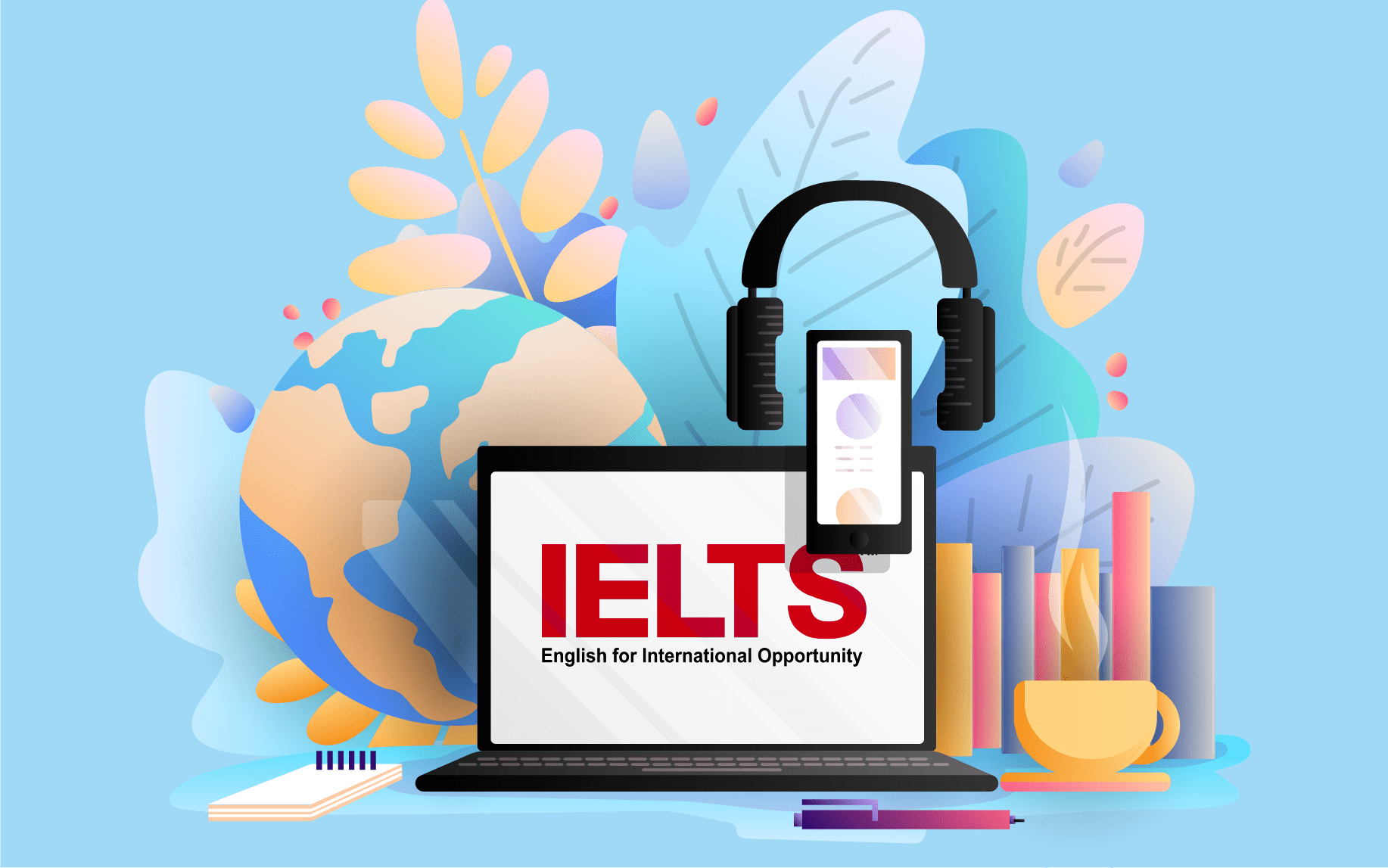
IELTS Listening Tips For Band 9
IELTS Listening Tips For Band 9
– Listen To English Conversations
– Watch English Movies And TV Shows
– Listen To Authentic English Recordings
– Examine The Questions Carefully
– Smartly Use The Allocated Time
– Avoid Wasting Time on Complicated Questions
– Pay Attention To What You Hear
– Avoid Being Distracted By Other Test-Takers
– Understand the British, American, and Australian accents
– Practice with Audio in Several Accents
– Don’t Skip Answering Any Question
– Check Your Spelling And Grammar
– Audit Your Work For Spelling And Grammar Mistakes
– Ensure That You Have Answered All Questions
1. Understand The Test Format
It’s essential to become familiar with the exam structure, question categories, and scoring methodology in order to perform well on the IELTS listening test.
– Test Format
The IELTS listening test is divided into four sections, each of which has ten questions. With the time allotted for transferring your responses to the answer sheet, the test lasts roughly 30 minutes. There are four sections:
Section 1: A discussion on a general topic between two people.
Section 2: A general topic monologue.
Section 3: A discussion between up to four people taking place in a training or educational environment.
Section 4: A discourse on an academic topic.
You will have time to read the questions prior to each section. There will be time after each part for you to review and transfer your responses to the answer sheet.
– Types Of Questions
In order to be ready, it is crucial to understand the types of questions you will be asked in each part. Multiple-choice, sentence completion, note completion, and matching are a few examples of typical question types.
You must select the right response from a list of alternatives for multiple-choice questions. Using the appropriate word or phrase, you must finish the sentence in a sentence completion quiz. You must complete the blanks on a diagram or map in note completion questions. You must match a list of words or objects with a list of alternatives in matching questions.
– Scoring System
The IELTS listening test is graded on a scale from 1 to 9, with each band representing a level of English ability. As the number of right answers determines the score, it is imperative to attempt every question.
Develop Your Listening Skills
To perform well on the IELTS listening test, you must improve your listening abilities. Here are some practical suggestions for enhancing your listening abilities:
– Listen To English Conversations
Regularly listening to English conversations is one of the finest methods to sharpen your listening abilities. You can listen to discussions between native speakers and non-native speakers, or you can even practice your language skills with a friend. You will become more adapted to varied speaking styles, intonations, and accents as a result.
– Watch English Movies And TV Shows
It’s enjoyable and helpful to practice listening skills by watching English-language movies and television programs. Subtitles can be turned on initially, then turned off gradually as your hearing skills advance. This will aid in your practical learning of new words, idioms, and expressions.
– Listen To English Podcast
Listening to English podcasts is a fantastic approach to develope your listening comprehension while learning new information. Podcasts are available on a variety of topics, including news, current affairs, entertainment, and education. Your overall phonological awareness will increase as a result of listening to podcasts since you’ll become more familiar with various accents and speaking styles.
– Practice Active Listening
Active listening entails participating in the conversation and paying thorough attention to the words being spoken. Focus on the speaker, make eye contact, and ask questions or offer comments to demonstrate that you are listening to practice active listening. You’ll be able to listen more efficiently in real life scenarios as a result of this.
3. Practice With Authentic Practice Material
To get ready for the IELTS listening test, practice using real resources. The following are some efficient techniques for exercising with real materials:
– Use IELTS Practice Material
Active listening entails participating in the conversation and paying thorough attention to the words being spoken. Focus on the speaker, make eye contact, and ask questions or offer comments to demonstrate that you are listening to practice active listening. You’ll be able to listen more efficiently in real life scenarios as a result of this.
– Listen To Authentic English Recordings
You can develop your listening skills and become more habituated to various accents and speaking styles by listening to actual English recordings such as news broadcasts, speeches, and interviews. Real English recordings are available online and in audiobooks. You can improve your listening comprehension skills and general language proficiency by listening to such recordings.
– Take Mock Test
Mock tests are a wonderful approach to check your preparation for the IELTS listening test by imitating the test atmosphere. Mock exams are available online and in IELTS study guides. By taking practice exams, you can discover your strengths and shortcomings and concentrate your practice on the things that need work.
4. Use Your Time Wisely
To do well on the IELTS Listening test, you must manage your time well. Here are some ideas for making the most of your time:
– Examine The Questions Carefully
Spend a moment attentively reading the questions before the recording begins. You can then have a better understanding of the subjects discussed in the tape and get ready to listen for precise details. Make sure you follow the directions and highlight any essential words or valuable info in the questions.
– Smartly Use The Allocated Time
There are four portions of the IELTS listening test, and each component contains a unique collection of questions. Before each section, you will have 30 seconds to read the questions. You will then have 10 minutes in the end to record your responses on the answer sheet. Make the most of this time by going over the questions again, highlighting crucial information, and formulating a listening plan.
– Avoid Wasting Time on Complicated Questions
If you encounter a challenging question, try not to dwell on it for too long. Go on to the next query and, if you have time, return to it later. Keep in mind that each question has the same score, so answering as many questions as you can is preferable to devote too much time to a few challenging ones.
5.Understanding First
The secret to succeeding on the IELTS listening test is to concentrate on understanding. Here are some pointers to aid your concentration on understanding:
– Pay Attention To What You Hear
Take note of the speaker’s tone, pacing, and pronunciation as you listen intently to the recording. Don’t let distractions like anxiety or noise impair your ability to listen. Make an effort to pay attention to the recording and concentrate on comprehending the information provided.
– Recognize The Context
To understand the meaning of the information offered in the tape, the context must be understood. Pay close attention to the recording’s introduction and conclusion, and make an effort to connect the information to the subject and the questions. By doing so, you’ll be better capable of understanding the recording’s goal and recognize the key points stated.
– Pay Attention To Details
Numerous question types that call for close attention to detail can be found on the IELTS listening test. Make sure to pay close attention to the information being provided and make note of crucial information such as names, dates, and numbers. You will be better able to respond to inquiries that specifically ask you to recall or recognize a certain piece of knowledge.
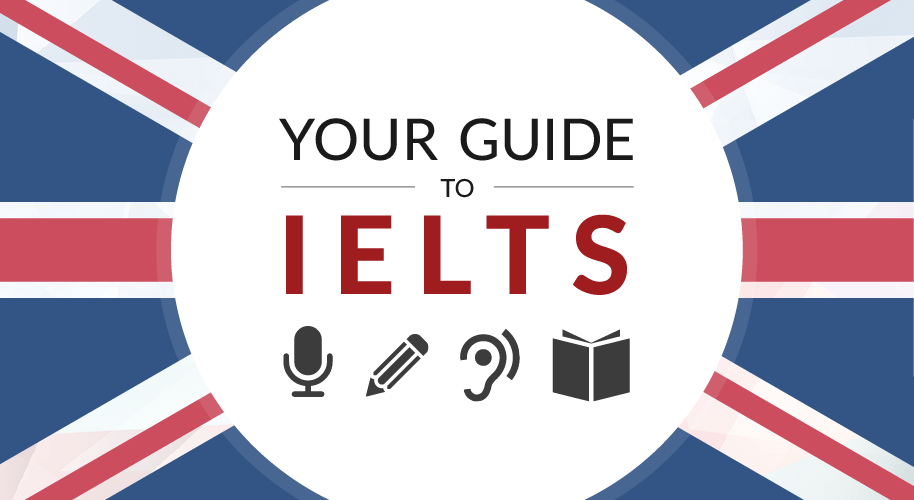
6. Avoid Being Distracted
It’s essential that you maintain your attention on task during the IELTS listening test. Here are some ideas to keep you concentrated:
– Maintain Your Concentration
Throughout the exam, maintain your attention on the audio and the questions. Do not allow yourself to become sidetracked or let your thoughts stray. Concentrate on the task at hand and make sure you comprehend the information being delivered.
– Ignore Background Noises
A noisy location might be used to administer the IELTS listening test. Nonetheless, it’s crucial to disregard the ambiance and concentrate on the recording. Noise-canceling headphones can help you focus better by reducing distractions.
– Avoid Being Distracted By Other Test-Takers
Other test-takers might complete the sections of the exam at a different pace or make noise while doing so. Do not be distracted by this. Keep your attention on your own test, and maintain a good attitude.
7. Learn Various Accents
To score well on the IELTS Listening test, you must be able to recognize various accents. The following advice will assist you in becoming familiar to various accents:
– Listen to Different Accents
Listen to a wide range of English-language recordings, including news shows, webcasts, and movies, to expose oneself to various English accents. This can help you get used to diverse accents and sharpen your listening abilities.
– Understand the British, American, and Australian accents
Different recordings, including those with British, American, and Australian accents, may be found on the IELTS listening test. Listen to audio recordings from these nations to get a feel for these accents. This will make it easier for you to comprehend each accent’s pronunciation, intonation, and rhythm.
– Practice with Audio in Several Accents
If you want to get better at understanding what you hear, practice listening to recordings with various accents. This will improve your capacity to identify different dialects and give accurate answers to test questions.
8. Take Notes
Having the ability to take notes is vital for performing well on the IELTS listening test. The following advice can help you take notes that are useful:
– Make Brief Notes
Make quick notes of the main points and crucial information from the recording. To assist you to recall the information, merely jot down the vital details such as names, numbers, and keywords.
– Highlight Key Points
Mark off significant passages in the recording that relate to the inquiries being made. This will enable you to concentrate on the crucial details and find the solutions swiftly.
– Arrange Your Notes
Arrange your notes using headings, bullet points, or diagrams to make them clear and logical. This will make it simpler and quicker for you to obtain the information you require throughout the exam.
9. Answering All Questions
To perform well on the IELTS listening test, it is essential to respond to all of the questions. Here are some hints to help you correctly respond to each question:
– Don’t Skip Answering Any Question
Even if you don’t know the answer to a question, you should still respond to it. It is usually preferable to guess if you are unsure because you will not be penalized for giving a false response.
– Respond As Best You Can
Use the knowledge you’ve acquired from the audio and your notes to provide the best possible answers to each question. Don’t question your answers, and only change them if you are positive they are erroneous.
– Check Your Spelling And Grammar
Spelling and grammar errors can cost you points, so be careful. Verify the accuracy of your answers and the precision of your spelling and grammar.
10. Check Your Answers
It’s important to double-check your responses to make sure you’ve correctly addressed each question on the IELTS listening test. Here are some pointers to aid you in reviewing your responses:
– Review Your Answers
When you have finished your test, set aside some time to go through your responses. This will give you an opportunity to double-check your work for errors and make sure you’ve resolved every query.
– Audit Your Work For Spelling And Grammar Mistakes
Grammar and spelling issues can lose you points, so double-check your work. Make sure your responses are precise, clear, and grammatically sound.
– Ensure That You Have Answered All Questions
Verify that you have responded to every question on the test. Consider going back and providing the best possible answers to any questions you may have missed.
Conclusion
In conclusion, many test-takers find the IELTS listening test to be a difficult experience. Yet, with the appropriate planning and strategy, you may enhance your performance and obtain the band score you want. The IELTS listening tips in this article can assist you in developing the critical abilities and test-taking techniques required to succeed.
Understanding the test structure and the kinds of questions you are going to encounter is crucial. You can improve your listening abilities by becoming familiar with real English texts, and different accents, and taking notes. During the test, effective time management is vital. Make the most of the allotted time, avoid getting sidetracked, and concentrate on understanding the content.
Consequently, checking your responses after each question can greatly increase your chances of success. You may approach the test with confidence and be well-prepared to accomplish your goals by putting these IELTS Listening strategies into practice. Do not forget to continually practice and ask for comments to enhance your performance. WISHING YOU SUCCESS!
IELTS Preparation
When it comes to prepare IELTS, everyone searches for a place where he or she can find one window solution in terms of preparing all the modules of IELTS at the same time, and with same pace for all the modules. While searching for best place to prepare IELTS in Pakistan, most students come across the name of Victoria IELTS College and then they can not go for any other option because of the quality we offer. Victoria IELTS College is the premium IELTS preparation institute in Lahore and Gujranwala, and our students are from all over the country including the remote areas. Students always consider Victoria IELTS College as the only choice because of the effort we put in them. Finding quality in competitive fee is a hassle, but Victoria IELTS College has solved this hassle. We offer one window solution for all the modules of IELTS including Listening, Reading, Writing and Speaking in very nominal fee. No academy in Pakistan provides such opportunity to the students aiming to settle abroad.
We have our campuses in Lahore and Gujranwala. Lahore is the second largest metropolitan city of Pakistan and Gujranwala is the fifth largest city of Pakistan. We aim to cover whole Pakistan through our online session, and student from across the country join us in our physical as well as in online preparation sessions.
Our methodology of teaching IELTS is unlike other institutes offering IELTS coaching to the aspirants. We cover all four modules daily. To assess the preparation level of students, we conduct weekly IELTS mock test in which we make students to follow the same pattern as happens in original IELTS exam. Therefore, our students find very little difference on exam day in terms of exam pressure. As we conduct classes on regular basis for Listening, Reading, Writing and Speaking, the results speak for the effort we put in while teaching IELTS to the students.
Our fees are most affordable in Pakistan when compared to the quality of education we provide. If someone wishes to find best IELTS preparation academy in Lahore, Victoria IELTS College is the place to choose.
Our IELTS preparation course is the best course in Pakistan. The action plan we provide to pupils ensures their success in IELTS test. Many institutes in Lahore and Pakistan offer demo classes for which students have to attend the physical session to judge how the preparation goes. We at Victoria IELTS College do not do like this. We have uploaded as-live demo classes for Listening, Reading, Writing and Speaking individually, so that students and IELTS aspirants who have to embark on the journey of success in IELTS may not need to invest their resources before taking decision. Students can better decide if our methodology suits them or not by watching our as-live lectures on our Facebook page, even before starting the classes formally. We are sure that students will always choose Victoria IELTS College after watching the demos, as we teach what is actually required for acing the exam. Students in Lahore and suburbs find us as the top option when they have to look for the IELTS preparation institutes near them. The duration of our preparation course is 6 weeks. We especially focus academically challenged students, and we make sure that students may not need to appear again in exam except for the first time after preparing IELTS from our institute.
We offer comprehensive services to our students, from studying and preparations to book for the exam. We are platinum plus partners with British Council and IDP, so we are considered in high ranks in terms of serving the students at best. We offer test booking services for our students. Students just have to pay the fee, and rest is on us. That is the reason, all of our students prefer booking their test dates from our platform. Students can choose to pay for IELTS preparation fee and IELTS test registration fee from all over the country from any payment platform as we facilitate students in all the possible ways.
At the end of the course, we also facilitate students in preparing for their next journey abroad as well.
So, what are you waiting for? Come and experience world-class IELTS preparation services at Victoria IELTS College.






